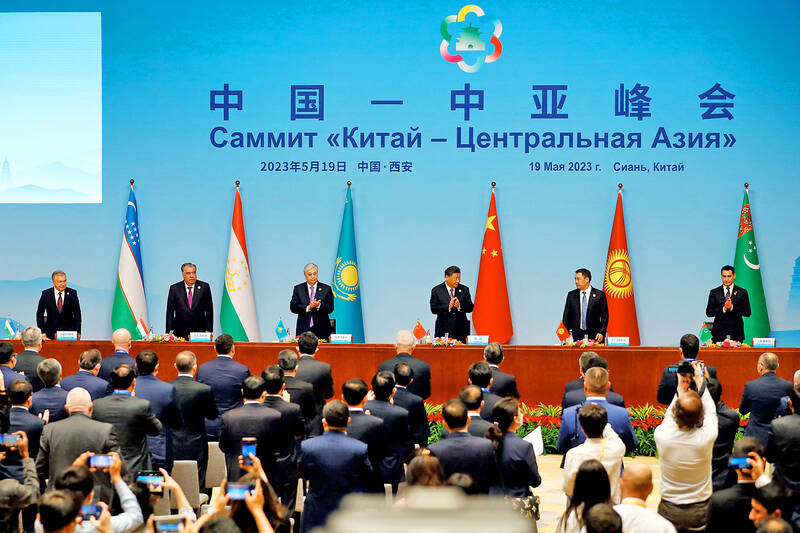China is ready to help Central Asian nations bolster their security and defense capabilities, Chinese President Xi Jinping (習近平) said at a summit of the region’s leaders, underscoring Beijing’s efforts to deepen its influence there as an expansionist Russia raises fresh security issues.
China can help the region improve its “law enforcement, security and defense capability construction,” Xi said during a keynote speech at the inaugural in-person China-Central Asia Summit, Xinhua news agency reported.
He said China would provide 26 billion yuan (US$3.7 billion) in financing support and “free assistance” to the countries.

Photo: AFP
The event assembled the leaders of Kazakhstan, Kyrgyzstan, Tajikistan, Turkmenistan and Uzbekistan for two days in the Chinese city of Xian, where they discussed ways to deepen ties on everything from defense to finance, trade and energy.
The summit came as US President Joe Biden joined other G7 leaders in Japan this week to discuss, among other things, measures to counter perceived Chinese threats to global economic security. The simultaneous meetings symbolized an increasingly multipolar world, as China tries to challenge the US-led system.
While Russia and China are united in that mission to counter Washington, Xi’s gathering of five former Soviet states without Russian President Vladimir Putin demonstrates Beijing’s increasingly senior position in their “no limits” relationship.
Since Russia began its invasion of Ukraine, the Kremlin has become reliant on China to provide economic cover from Western sanctions and much-needed diplomatic support.
Russian Prime Minister Mikhail Mishustin would next week lead a delegation to a Shanghai business forum that has also invited sanctioned tycoons, exemplifying how China can shelter Moscow from Western economic sanctions.
At the summit, Xi also stressed that Central Asia has the “conditions and capabilities” to become a Eurasian hub, adding that their “sovereignty, security, independence and territorial integrity” must be “safeguarded.”
That emphasis on their “sovereignty” came weeks after Chinese Ambassador to France Lu Shaye (盧沙野) sparked a firestorm when he questioned the independence of former Soviet states during a television interview.
Russia’s invasion of Ukraine in February last year deepened a tussle for influence in the resource-rich Central Asian states, which were already on a trajectory of economic realignment toward China.
Last year, Kyrgyzstan, Uzbekistan and Turkmenistan each did more trade with China than with either Russia or the G7 bloc, the IMF said.
Chinese imports from the region are mostly commodities, including cotton, oil, natural gas and copper, official trade data showed.
China made some inroads on other economic ties during this week’s summit.
On Thursday, Kazakhstan and Uzbekistan vowed to ensure the stable supply of gas to China.
The two countries combined accounted for about 6.4 percent of China’s gas imports in 2021, but Uzbekistan last year began reducing Chinese exports so it could keep more fuel for its growing domestic petrochemical industry.
In Taipei, Taiwan’s Ministry of Foreign Affairs yesterday strongly protested and condemned four joint statements issued by China and four Central Asian countries supporting China’s territorial claim over Taiwan.
The leaders of Kazakhstan, Kyrgyzstan, Uzbekistan, and Tajikistan separately signed bilateral statements with Xi following the China-Central Asia Summit, according to the ministry.
The statements, which claimed that Taiwan is an inalienable part of China’s territory, deviated from the fact that the People’s Republic of China (PRC) and the Republic of China (ROC) have never been subordinate to each other and Taiwan has never been ruled by the PRC, MOFA said.
No country has the right to deny the existence of the ROC, nor are they able to do so by issuing a joint statement with China, the ministry said via a press release.
Additional reporting by CNA

SEPARATE: The MAC rebutted Beijing’s claim that Taiwan is China’s province, asserting that UN Resolution 2758 neither mentions Taiwan nor grants the PRC authority over it The “status quo” of democratic Taiwan and autocratic China not belonging to each other has long been recognized by the international community, the Mainland Affairs Council (MAC) said yesterday in its rebuttal of Beijing’s claim that Taiwan can only be represented in the UN as “Taiwan, Province of China.” Chinese Minister of Foreign Affairs Wang Yi (王毅) yesterday at a news conference of the third session at the 14th National People’s Congress said that Taiwan can only be referred to as “Taiwan, Province of China” at the UN. Taiwan is an inseparable part of Chinese territory, which is not only history but

CROSSED A LINE: While entertainers working in China have made pro-China statements before, this time it seriously affected the nation’s security and interests, a source said The Mainland Affairs Council (MAC) late on Saturday night condemned the comments of Taiwanese entertainers who reposted Chinese statements denigrating Taiwan’s sovereignty. The nation’s cross-strait affairs authority issued the statement after several Taiwanese entertainers, including Patty Hou (侯佩岑), Ouyang Nana (歐陽娜娜) and Michelle Chen (陳妍希), on Friday and Saturday shared on their respective Sina Weibo (微博) accounts a post by state broadcaster China Central Television. The post showed an image of a map of Taiwan along with the five stars of the Chinese flag, and the message: “Taiwan is never a country. It never was and never will be.” The post followed remarks

INVESTMENT WATCH: The US activity would not affect the firm’s investment in Taiwan, where 11 production lines would likely be completed this year, C.C. Wei said Investments by Taiwan Semiconductor Manufacturing Co (TSMC, 台積電) in the US should not be a cause for concern, but rather seen as the moment that the company and Taiwan stepped into the global spotlight, President William Lai (賴清德) told a news conference at the Presidential Office in Taipei yesterday alongside TSMC chairman and chief executive officer C.C. Wei (魏哲家). Wei and US President Donald Trump in Washington on Monday announced plans to invest US$100 billion in the US to build three advanced foundries, two packaging plants, and a research and development center, after Trump threatened to slap tariffs on chips made

CONSISTENT COMMITMENT: The American Institute in Taiwan director said that the US would expand investment and trade relationships to make both nations more prosperous The US would not abandon its commitment to Taiwan, and would make Taiwan safer, stronger and more prosperous, American Institute in Taiwan Director Raymond Greene said. “The US’ commitment to Taiwan has been consistent over many administrations and over many years, and we will not abandon our commitment to Taiwan, including our opposition to any attempt to use force or coercion to change Taiwan’s status,” he said in an exclusive interview with the Liberty Times (the sister newspaper of the Taipei Times) on Friday last week, which was published in the Chinese-language newspaper yesterday. The US would double down on its efforts